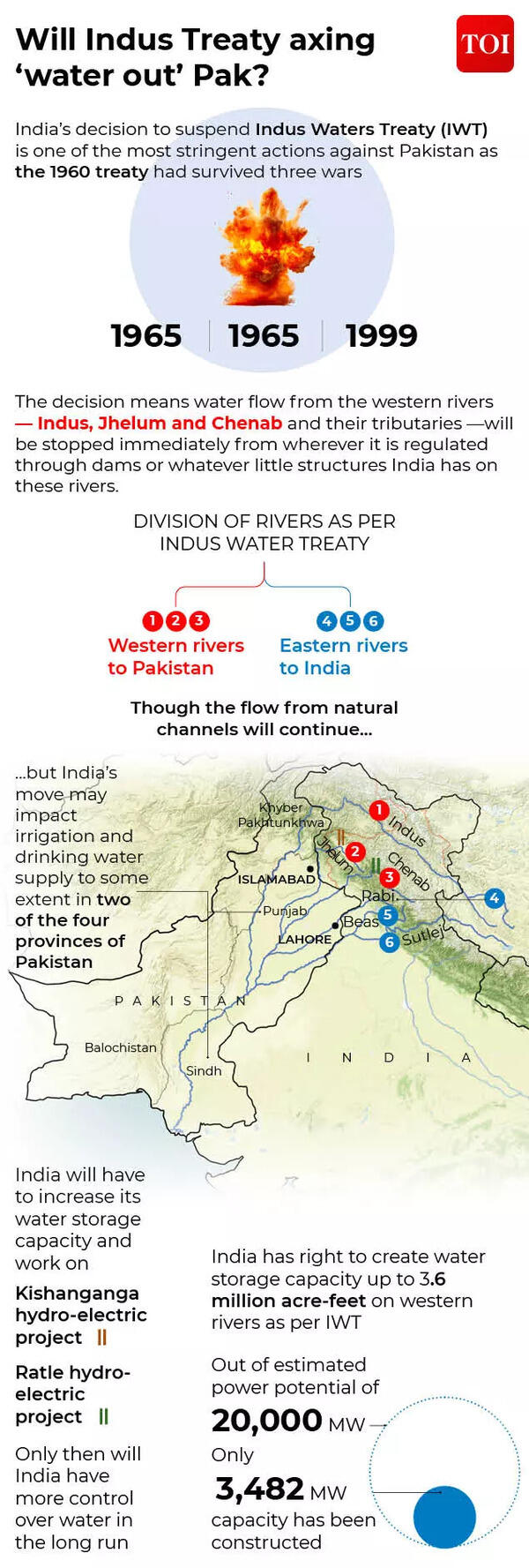Water war? How is India planning to remove water from the Indus river system, leave Pakistan high and drought, India news

New Delhi: India is considering a significant increase in water use from the Indus river system, a step that can significantly reduce the water supply to Pakistan. This development increased after a deadly terrorist attack in Pahgam in Jammu and Kashmir by Pakistan -backed militants on 22 April. After the attack, India suspended its participation in the Indus Waters Treaty (IWT), a historic water-sharing agreement between the two countries, historically regulated the use of the Indus River and its tributaries.Despite the ceasefire agreement after the acute fight in early May, the Indus Water Treaty remains suspended, and according to a report by Reuters, India’s water projects are moving forward.
Voting
What is your opinion on the expansion of Ranbir Canal on the Chenab River?
Experts note that large -scale infrastructure projects take years to complete, the initial effects on political messages and water flow are already important. The situation is liquid, there is a possibility of a new flashpoint in already stressful India-Pakistan relations for water.
Indus Water Treaty
In 1960, the World Bank allocates the Broken Indus Waters Treaty, six rivers water between India and Pakistan. India controls Eastern rivers – Sutlage, Beas and Ravi – while the western rivers of Pakistan – Indus, Chenab and Jhelum have authority. Under the treaty, India is allowed to use limited use of western rivers for irrigation and hydroelectric projects, but should not significantly affect water flow in Pakistan.

After the April 22 terrorist attack in Pahgam, in which 26 citizens were killed, India suspended their rearing for the adherence to the ecosystems, referring to Pakistan’s across terrorism. Minister of External Affairs S. Jaishankar has made it clear that the treaty will be “in Abhay” as long as Pakistan reliably and irreversibly prevents cross -border terrorism. He also emphasized that India is ready to return to terrorism related issues with Pakistan and illegally occupied in Pakistan -occupied Kashmir (POK), rejecting a comprehensive conversation on Kashmir or rejecting the treaty for the time.
What is India planning
In a strategic move, India is accelerating the plans to increase its drainage from the Indus river system, especially focusing on chainb, Jhelum and Indus rivers, which are mainly allocated to Pakistan under the treaty. One of the most influential projects under consideration is the expansion of the Ranbir Canal on the Chenab River. Originally built in the 19th century and currently about 60 km long, the plan is to increase this canal to 120 kilometers. In this detail, India’s capacity will be more than 40 cubic meters per second to 150 cubic meters per second, which will significantly reduce the flow of water in the Punjab province of Pakistan, a major agricultural sector.Additionally, India is searching for other irrigation and hydroelectric projects that can reduce water availability. Government documents reviewed by Reuters indicate proposals to redirect water from the Indus, Jhelum and Chenab rivers in rivers within the Northern Indian states, which further limit the flow of water in Pakistan. These projects include the construction of capable dams in large quantities of water storage, which have not been done earlier on western rivers under India’s sanctions.
Impact on Pakistan
Pakistan depends on the Indus river system about 80% of agriculture and most of its hydroelectric generations. Any decrease in water flow can result in serious consequences for Pakistan’s food security, economy and energy supply. Islamabad has already recorded a glimpse of pressure if India proceeds with its plans if Indian maintains a 90% decline in the water level after Indian maintenance work on Indus projects.Pakistan has condemned the suspension of the Treaty of India and warned that efforts to prevent or remove water flow will be considered as “war work”. The Indus Waters Treaty has long been considered one of the most successful water-sharing agreements globally, which has survived many wars and ongoing tension.




